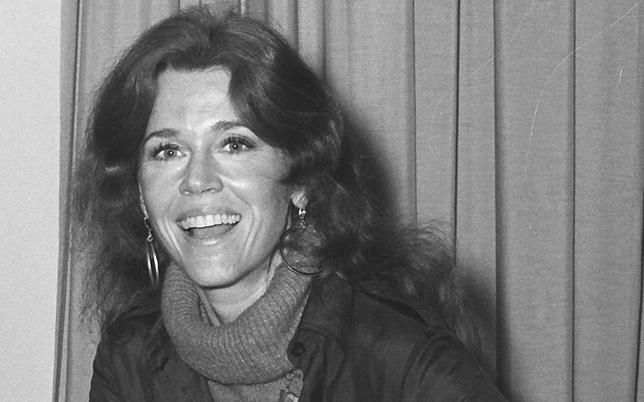
- Industry
Jane Fonda
Jane Fonda was born Lady Jayne Seymour Fonda on December 21, 1937 in New York.
She grew up in Beverly Hills with her movie star father Henry Fonda, so it was perhaps inevitable that she and her younger brother Peter would become actors. In 1958 Jane studied acting with Lee Strasberg at the Actors studio in Malibu California and in the 1960s embarked on a thriving movie career, starring in films like Tall Story (1960) with Anthony Perkins, Walk on the Wild Side (1962) with Laurence Harvey, Period of Adjustment (1962) by George Roy Hill, Cat Ballou (1965) a comedy western with Lee Marvin, Any Wednesday (1966) with Jason Robards, Barefoot in the Park (1967) with Robert Redford and the campy Barbarella (1968) directed by her French husband Roger Vadim. In 1969 Fonda, who had been living in Paris, returned to Los Angeles with her baby daughter Vanessa, and became a political activist to oppose the Vietnam War. She also started making more substantial films, They Shoot Horses, Don’t They? (1969) by Sidney Pollack and Klute (1971) by Alan Pakula with Donald Sutherland.
In April 1970 with Sutherland she embarked on a tour of U.S. Army bases in the Pacific with the anti-war stage show FTA (Free/Fuck the Army), in July 1972 she visited North Vietnam and she infamously posed for a photograph seated on an anti-aircraft gun, earning the nickname “Hanoi Jane.”
In 1973 she married Tom Hayden and had a son, Troy Garity. In 1976 with her politician husband they founded the grass-roots organization Campaign for Economic Democracy. Interviewed by the journalists of the Hollywood Foreign Press in 1985, Jane Fonda attributed her political commitment to her father’s influence: “I was always brought up to stand up for the underdog, to try to use whatever abilities, skills, talent, power I had to help people who were disenfranchised. My father always believed that in his innermost self, and because I loved him, I took that on.”
In 1977 Fonda made the comedy Fun With Dick and Jane with George Segal and played Lillian Hellman in Julia by Fred Zinneman with Vanessa Redgrave; then, wanting more control over the roles she played, she started a production company, IPC Films, with her partner Bruce Gilbert. Their first film was Coming Home (1978) by Hal Hasby with Jon Voight and Bruce Dern, which dramatized the emotional costs of the Vietnam War, then The China Syndrome (1979) by James Bridges with Jack Lemmon and Michael Douglas, about the corporate cover-up of problems at a nuclear power plant, Nine to Five (1980) with Lily Tomlin and Dolly Parton, a comedy about working women overthrowing their sexist boss, and Rollover (1981) by Alan Pakula with Kris Kristofferson, exposing the structure of international finance. She also made two modern westerns, Comes a Horseman (1978) by Alan Pakula with James Caan and The Electric Horseman (1979) by Sidney Pollack with Robert Redford. In the last film produced by IFC, On Golden Pond (1981) by Mark Rydell with Katherine Hepburn and Henry Fonda, Jane was able to explore the complicated relationship she had with her father, after her mother’s suicide when she was 12, and his marriage to a younger wife. She said to HFPA in 1981: “I reconciled with my father at least 10 years ago or more. Whatever little differences we had around the Vietnam War or earlier, when I was trying to discover my own identity that happened quite a long time ago. My father is a very introverted person, and sometimes we needed to be reminded that he loved us because we weren’t sure of it.”
Fonda continued to produce engaging films throughout the 1980s, the TV movie The Dollmaker (1984), Agnes of God (1985) by Norman Jewison, The Morning After (1986) by Sidney Lumet with Jeff Bridges, Old Gringo (1989) with Gregory Peck, Stanley & Iris (1990) by Martin Ritt with Robert De Niro.
She retired from acting after her marriage to TV mogul Ted Turner in 1991 and moved to Atlanta, Georgia, to live with her third husband. As she explained to HFPA in 2005: “I was miserable. Every day I would wake up to go to work scared to death and I didn’t want to do it any more. Then I met Ted Turner and I didn’t have to do it. I was very grateful.”
In 1996 she wrote a cookbook, Jane Fonda: Cooking or Healthy Living, then, after divorcing Turner in 2001, she started working on her memoirs, publishing My Life So Far in 2005, and returning to films with the Jennifer Lopez comedy Monster-in-Law, Georgia Rule (2007) by Garry Marshall and Peace Love and Misunderstanding (2011).
She has a recurring role in the TV series The Newsroom (2012-2013-2014) and played Nancy Reagan in The Butler (2013) with Forest Whitaker. In 2011 Fonda wrote another book, Prime Time, full of practical tips for older women, and she continues to produce fitness videos, as she has been doing since the early 80s, now focusing on exercises for seniors.
Having worked with teenagers since the 1980s, when with Tom Hayden she opened the Laurel Springs Children’s Camp in Santa Barbara, then having founded the Georgia Campaign for Adolescent Pregnancy Prevention in 1996, this year Fonda published a book of advice for teenagers, Being a Teen: Everything Teen Girls & Boys Should Know About Relationships, Sex, Love, Health, Identity & More.
The Hollywood Foreign Press recognized Jane Fonda as New Star of the Year in 1962 for her first film Tall Story, as World Film Favorite in 1979 and 1980, honored her with 3 Golden Globes as best Actress, for Klute (1972), Julia (1978) and Coming Home (1979). She was also nominated seven times, for Period of Adjustment (1963), Cat Ballou (1966), Any Wednesday (1967), They Shoot Horses, Don’t They? (1970), The China Syndrome (1980), On Golden Pond (1982) and The Dollmaker (1985).